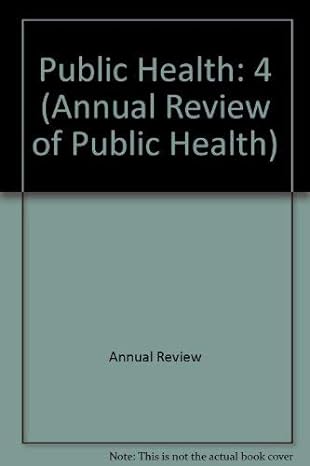Advances in Gender-Transformative Approaches to Health Promotion.
IF 21.4
1区 医学
Q1 PUBLIC, ENVIRONMENTAL & OCCUPATIONAL HEALTH
引用次数: 6
Abstract
Gender is an important determinant of health, but explicit attention to gender is often missing in health promotion. We build on Pederson and colleagues' gender-transformative framework for health promotion to propose four guiding principles for gender-transformative health promotion. First, health promotion must address gender norms directly if it is to improve health outcomes. Second, it should move beyond individual change to engage explicitly with structural and social determinants of health. Third, it should address underlying gender-related determinants in order to influence health outcomes. And fourth, it requires complexity-informed design, implementation, and evaluation. We provide background on key concepts that are essential for designing, implementing, and evaluating gender-transformative health promotion: gender norms, socioecological approaches, and the gender system. We give examples of the four principles in practice, using the case of postnatal mental health promotion in Australia and sexuality education in Mexico. These four principles can be applied to health promotion efforts across contexts and outcomes to address the harmful gender norms that contribute to poor health as a part of broader efforts to improve health and well-being.促进健康的性别变革方法的进展。
性别是健康的一个重要决定因素,但在健康促进中往往缺乏对性别的明确关注。在Pederson及其同事提出的促进健康的性别变革框架的基础上,我们提出了促进健康的性别变革的四项指导原则。首先,如果要改善健康结果,健康促进必须直接解决性别规范问题。其次,它应超越个人改变,明确参与健康的结构和社会决定因素。第三,它应处理与性别有关的基本决定因素,以便影响健康结果。第四,它需要基于复杂性的设计、实现和评估。我们提供了设计、实施和评估性别转型健康促进所必需的关键概念的背景:性别规范、社会生态学方法和性别系统。我们以澳大利亚的产后心理健康促进和墨西哥的性教育为例,在实践中举例说明这四项原则。这四项原则可应用于各种情况和结果的健康促进工作,以解决导致健康状况不佳的有害性别规范,作为改善健康和福祉的更广泛努力的一部分。
本文章由计算机程序翻译,如有差异,请以英文原文为准。
求助全文
约1分钟内获得全文
求助全文
来源期刊

Annual Review of Public Health
医学-公共卫生、环境卫生与职业卫生
CiteScore
26.60
自引率
1.40%
发文量
36
审稿时长
>12 weeks
期刊介绍:
The Annual Review of Public Health has been a trusted publication in the field since its inception in 1980. It provides comprehensive coverage of important advancements in various areas of public health, such as epidemiology, biostatistics, environmental health, occupational health, social environment and behavior, health services, as well as public health practice and policy.
In an effort to make the valuable research and information more accessible, the current volume has undergone a transformation. Previously, access to the articles was restricted, but now they are available to everyone through the Annual Reviews' Subscribe to Open program. This open access approach ensures that the knowledge and insights shared in these articles can reach a wider audience. Additionally, all the published articles are licensed under a CC BY license, allowing users to freely use, distribute, and build upon the content, while giving appropriate credit to the original authors.
 求助内容:
求助内容: 应助结果提醒方式:
应助结果提醒方式:


